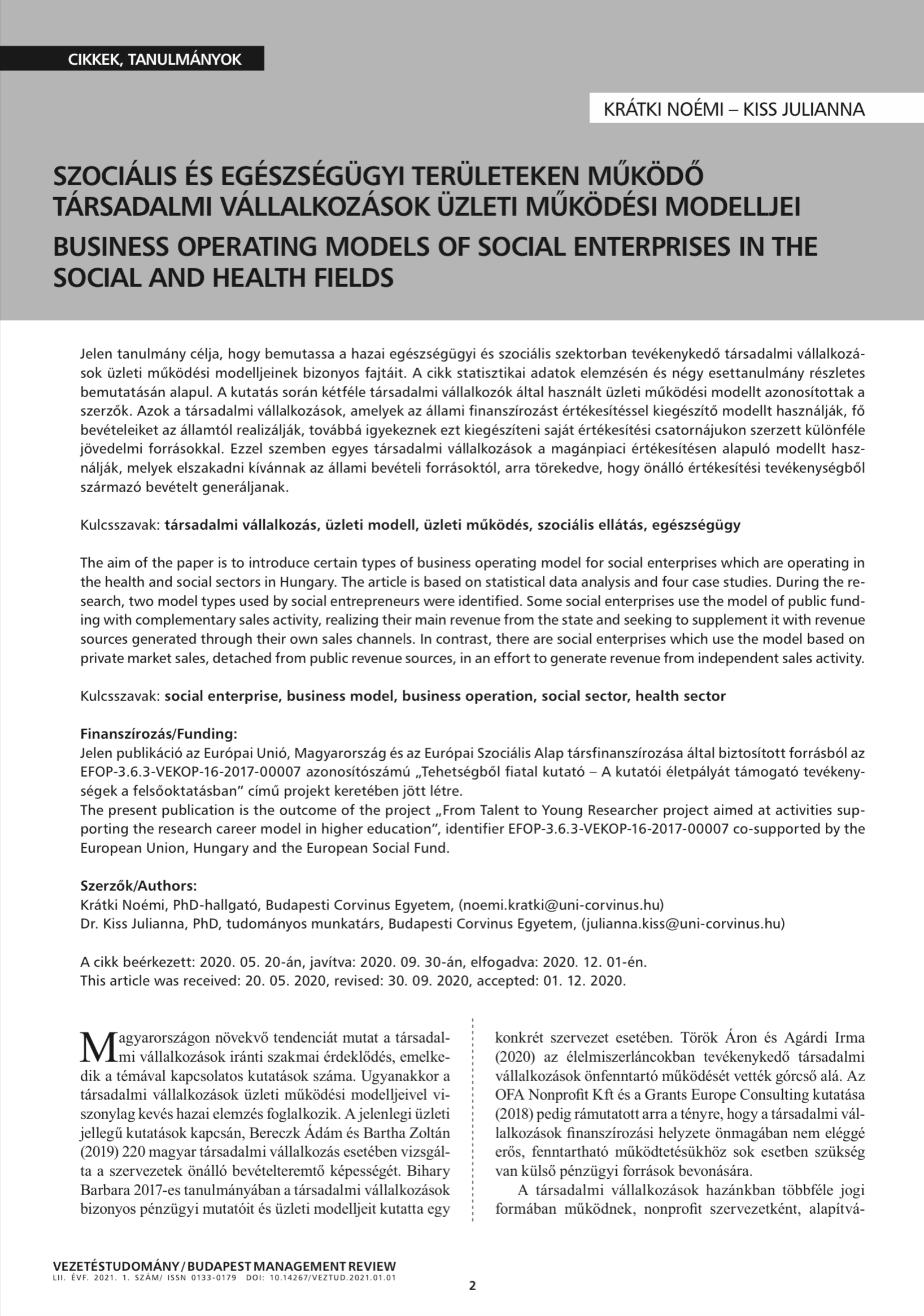Szociális és egészségügyi területeken működő társadalmi vállalkozások üzleti működési modelljei
DOI:
https://doi.org/10.14267/VEZTUD.2021.01.01Keywords:
social enterprise, business model, business operation, social sector, health sectorAbstract
The aim of the paper is to introduce certain types of business operating model for social enterprises which are operating in the health and social sectors in Hungary. The article is based on statistical data analysis and four case studies. During the research, two model types used by social entrepreneurs were identified. Some social enterprises use the model of public funding with complementary sales activity, realizing their main revenue from the state and seeking to supplement it with revenue sources generated through their own sales channels. In contrast, there are social enterprises which use the model based on private market sales, detached from public revenue sources, in an effort to generate revenue from independent sales activity.
Downloads
References
Alter, K. (2007). Social enterprise typology. Virtue Ventures LLC. Retrieved from https://www.globalcube.net/clients/philippson/content/medias/download/SE_typology.pdf
Anacleto, K., Paiva, R., & Moura L. (2017). Propolis Project: Development of a social business model proposal. Revista Eletrônica de Estratégia & Negócios, 10(3). 27-46. http://dx.doi.org/10.19177/reen.v10e3201727-46
Ashoka Honlapja (2020). Szervezettörténet. https://ashokacee.org/hungary/rolunk/
Ashraf, Md. M., Razzaque, M. A., Liaw, S-T., Ray, P. K., & Hasan, Md. R. (2019). Social business as an entrepreneurship model in emerging economy: Systematic review and case study. Management Decision, 57(5), 1145-1161. http://dx.doi.org/10.1108/MD-04-2017-0343
Bereczk, Á. & Bartha, Z. (2019). A társadalmi vállalkozások piaci bevételszerző képességének meghatározó tényezői. E-conom, 8(1), 102-107. https://doi.org/10.17836/EC.2019.1.102
Bihary, B. (2017). A Kockacsoki Nonprofit Kft. teljesítménymérése a Social Enterprise Scorecardmodell alkalmazásával. E-conom, 6(1), 53-66. http://dx.doi.org/10.17836/EC.2017.1.053
Dees, G. (1998). The meaning of social entrepreneurship. Retrieved from http://www.redalmarza.cl/ing/pdf/TheMeaningofsocialEntrepreneurship.pdf
Defourny, J. & Nyssens, M. (2016). Fundamentals for an international typology of social enterprise models. ICSEM Working Papers. No33. http://dx.doi.org/10.1007/s11266-017-9884-7
Csáky, Gy., Fehér, T., Laczkó, Zs., Molnár, Gy., Ormai, G., & Tóth, L. (2014). Út a szociális vállalkozások felé. Módszertani füzet 3. Budapest: Esély Labor Egyesület. http://www.pestesely.hu/doc/szocialis_vallalkozas_5v-1.pdf
Defourny, J. & Nyssens, M. (2008). Social enterprise in Europe: Recent trends and developments. Social Enterprise Journal, 4(3), 202-228. https://doi.org/10.1108/17508610810922703
Defourny, J., Hulgard, L., & Pestoff, V. (2014). Introduction to the ”SE field”. In Defourny, J., Hulgard, L., & Pestoff, V. (eds.), Social enterprise and the third sector – Changing European landscapes in a comparative perspective (pp. 1-15). New York: Routledge. Európai Bizottság (2017). Social enterprises. Retrieved from http://ec.europa.eu/growth/sectors/social-economy/enterprises_hu
G. Fekete, É., Bereczk, Á., Kádárné Horváth, Á., Kiss, J., Péter, Zs., Siposné Nándori, E.. & Szegedi, K. (2017). Alapkutatás a társadalmi vállalkozások működéséről. Retrieved from http://piactars.hu/uploads/files/documents/Zarotanulmany_OFA_ME_GTK_2017_06_30.pdf
Grassi, W. (2012). Business Models of Social Enterprise: A Design Approach to Hybridity. ACRN Journal of Entrepreneurship Perspectives, 1(1), 37–60. http://www.acrn-journals.eu/resources/JoE012012/Grassl_SE-Hybridity.pdf
Kiss, J. (2018). A társadalmi vállalkozások megjelenése, intézményesülése és kapcsolódása a nonprofit szektorhoz Magyarországon (PhD-disszertáció). Budapest: Eötvös Loránd Tudományegyetem Társadalomtudományi Kar, Szociológia Doktori Iskola.
Kiss, J., Krátki, N. & Deme, G. (2020). Társadalmi vállalkozások a szociális és egészségügyi szektorokban: intézményi környezet és szervezeti aktivitás. Esély, 31(3), 28-51. http://www.esely.org/kiadvanyok/2020_3/28-51_kiss_julianna.pdf
Kiss, J. & Mihály, M. (2019). Társadalmi vállalkozások és ökoszisztémáik Európában. Magyar országjelentés. Luxembourg: Publications Office of the European Union. https://doi.org/10.2767/668169OFA
Nonprofit Kft & Grants Europe Consulting (2018). Pénzügyi eszközök és pénzügyi eszközök kihelyezése társadalmi vállalkozásokhoz kutatás. http://www.piactars.hu/uploads/files/documents/OFA-Penzugyi_eszkozok_kutatas_VEGLEGES.pdf
Osterwalder, A. & Pigneur, Y. (2010). Business model generation, A handbook for visionaries, game changers, and challengers. Hoboken: John Wiley & Sons, Inc.
Repisky M. & Tóth, J. (2019). Mi motivál egy társadalmi vállalkozót? Egy feltáró kvalitatív kutatás eredményei. Vezetéstudomány, 50(3), 11-24. http://dx.doi.org/10.14267/ VEZTUD.2019.03.02
Santos, F., Pache, A-C. & Birkholz, C. (2015). Making hybrids work: Aligning business models and organizational design for social enterprises. California Management Review, 57(3), 36-58. https://doi.org/10.1525/cmr.2015.57.3.36
Seforis Consortium (2016). Country Report Hungary. A first analyses and profiling of social enterprises in Hungary. http://www.seforis.eu/hungary
Török, Á. & Agárdi, I. (2020). Társadalmi vállalkozások gasztronómiai lehetőségei a rövid élelmiszerellátási láncok bevonásával Magyarországon. Vezetéstudomány, 51(3), 74-84. http://dx.doi.org/10.14267/VEZTUD.2020.04.07

Downloads
Published
How to Cite
Issue
Section
License
Authors assign copyright to Vezetéstudomány / Budapest Management Review. Authors are responsible for permission to reproduce copyright material from other sources.

